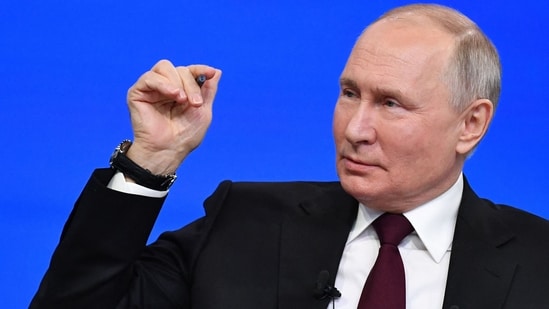Russian President Vladimir Putin has signed into law a controversial measure aimed at confiscating property from individuals and organizations deemed to be critics of Russia’s military offensive in Ukraine. The law, which was swiftly approved by the Russian parliament, has sparked widespread condemnation from human rights groups and Western governments.
Under the new legislation, Russian authorities have been granted expansive powers to seize assets belonging to individuals and entities that express dissenting views regarding Russia’s actions in Ukraine. This includes not only physical property but also financial assets and intellectual property rights. The law is part of a broader crackdown on dissent within Russia and serves as a means to suppress opposition voices and stifle any form of criticism of the government’s policies.

SOURCE:- BBC NEWS
Critics argue that the law represents a grave violation of freedom of expression and the right to dissent, principles enshrined in both international law and the Russian Constitution. By targeting those who voice opposition to the Kremlin’s actions, the Russian government is effectively silencing dissent and further consolidating its control over the country’s political landscape.
SOURCE:- INDIA TODAY
Furthermore, the law underscores the increasingly authoritarian nature of Putin’s regime and its disregard for democratic norms and principles. With the Kremlin tightening its grip on power and curtailing civil liberties, Russia is moving further away from the path of democratization and towards authoritarianism.
The timing of the law’s enactment is particularly significant, coming amid escalating tensions between Russia and Ukraine. The Russian military buildup near the Ukrainian border has raised fears of a potential large-scale conflict, prompting international concern and calls for de-escalation. By stifling dissent at home, Putin may be seeking to quash any domestic opposition to his aggressive policies towards Ukraine and deflect attention away from mounting economic challenges and internal discontent.
The international community has condemned the new law, with Western governments denouncing it as a blatant attack on fundamental freedoms and democratic values. The European Union, the United States, and other countries have warned of potential consequences for Russia’s actions, including the imposition of sanctions and diplomatic isolation.
Despite the criticism, Putin’s government remains defiant, portraying the law as necessary for maintaining national security and preserving stability. Russian officials have dismissed allegations of human rights abuses and defended the measure as a legitimate response to what they perceive as threats to Russia’s interests.
However, the passage of the law has further strained Russia’s already tense relations with the West and deepened concerns about the erosion of democracy and the rule of law within the country. As Putin consolidates his grip on power and suppresses dissent, the future of democracy in Russia appears increasingly uncertain.
Share your views in the comments

